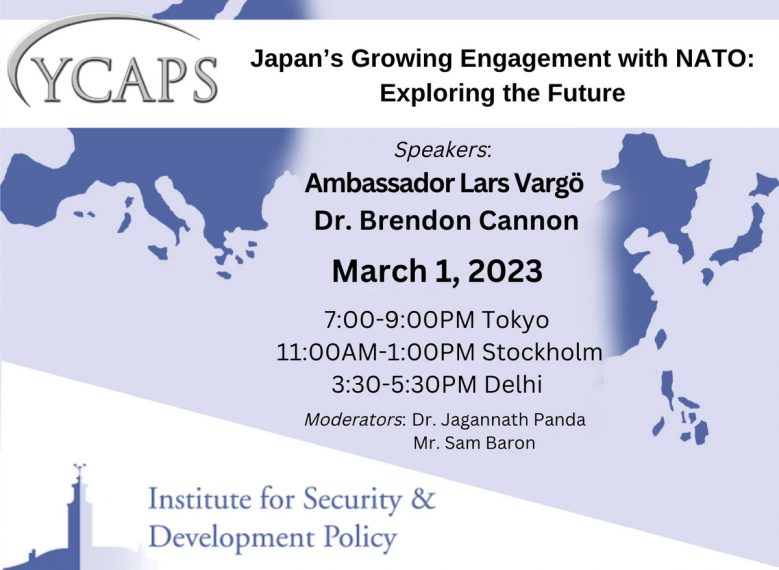Japan’s Growing Engagement with NATO: Exploring the Future

Following the Russia-Ukraine War, Japan’s partnership with the North Atlantic Treaty Organization (NATO) experienced a rapid upswing. In April 2022, Japanese Foreign Minister Hayashi Yoshimasa attended the NATO Foreign Ministers’ Meeting, and in May, Japan’s highest-ranking uniformed officer in the Self Defence Force (SDF) attended the NATO Military Chiefs of Defense Meeting for the very first time. The growing and dedicated engagement between NATO and Japan demonstrates its potential as an emerging partnership of mutual interest for both sides, with ample opportunities for US-NATO-Japan trilateral cooperation to counter Chinese influence in both Asia and Europe.
Under Shinzo Abe, Japan’s ties with NATO remained largely focused on maritime security, disaster relief and non-proliferation. The expanded focus on cybersecurity, new technologies, and countering disinformation under Prime Minister Fumio Kishida has led to an expansion of cooperation driving forward the importance of NATO in Japan’s security outlook. Kishida’s recent call for revisions to Japan’s pacifist constitution, and the release of a National Security Strategy which coincides with a proposed review of Japan’s national defence strategy to remove restrictions on striking enemy bases, further demonstrates Japan’s willingness to expand its existing defense ties with NATO and the EU.
Japan’s strategic alignment with both the EU and NATO is growing, while Kishida’s eagle-eye on the US-Japan alliance is strong. Concurrently, Japan’s security ties with European countries such as France and the UK are on the rise. As such, renewed cooperation with NATO should be viewed as a natural progression of Kishida’s vision for Japan’s enhanced security engagement with Europe.
In light of these developments, Japan’s growing ties with NATO raise a number of critical questions:
- What factors should drive Japan’s future cooperation with NATO?
- Will formal engagement with NATO strengthen Tokyo’s relationship with the EU?
- How should Japan position itself in Europe to expand and maintain its growing strategic alignment with NATO? Is such growing alignment inevitable?
In order to delve into some of these questions, YCAPS will be joined by Ambassador Lars Vargö, head of the Japan Center at the Institute for Security and Development Policy, and Dr. Brendon Cannon, Assistant Professor of Security Studies at Khalifa University, for a roundtable discussion co-moderated by Dr. Jagannath Panda and Mr. Sam Baron.
Speakers:
Dr. Lars Vargö is the former Swedish Ambassador to Japan (2011-14) and South Korea (2006-11). He holds a Ph.D. in Japanese studies (history) from the University of Stockholm (1982). He graduated from Uppsala University 1972 with a major in sinology. In 1972-76 he was a repeat Mombusho scholar at Kyoto University. As a diplomat, Vargö has returned to Japan four times, but has also served in Libya, Lithuania and the United States. During 2001-2005 he served as an Ambassador and the Head of the International Department of the Swedish Parliament. Vargö has published a number of books on Japan in Swedish, mainly in the fields of history and literature, but is also the author of numerous articles in Swedish, English and Japanese. He has translated Japanese novels, short stories and poetry into Swedish. He is the founder of the Seoul Literary Society, as well as the Tokyo International Literary Society. Vargö has been decorated with the “Grand Cordon of the Order of the Rising Sun” (2014), the “Kwanghwa Medal Order of Diplomatic Service” (2011) and the “Korean Red Cross Grand Taegug Award” (2007).
Dr. Brendon J. Cannon is an Assistant Professor of International Security at Khalifa University, Abu Dhabi, UAE. He earned a Ph.D. in Political Science from the University of Utah, USA (2009) and held previous academic positions in Tokyo and Nairobi. His research is at the nexus of international relations, security studies, and geopolitics. He has published on topics related to regional security and geopolitics, the arms industry, and shifting distributions of power across the Indo-Pacific. Cannon’s articles appear in Defence Studies, Small Wars and Insurgencies, Asian Security and Third World Quarterly. His new book, edited with Kei Hakata, is Indo-Pacific Strategies: Navigating Geopolitics at the Dawn of a New Age (Routledge, 2021).
Webinar Cost: Free of charge
Chair: Dr. Jagannath Panda, ISDP
Co-Chair: Mr. Sam Baron, YCAPS
Format: This event will be off-the-record. Questions are encouraged. It will not be recorded.